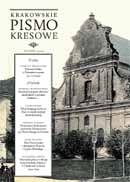Obywatele polscy w obozie kontrwywiadu „Smiersz” w Charkowie w latach 1944-1945
Poles at the „Smersh” counter-intelligence’s camp at Kharkiv in 1944-1945
Author(s): Aleksandra ArkuszSubject(s): History
Published by: KSIĘGARNIA AKADEMICKA Sp. z o.o.
Keywords: Kharkiv; Camp “Smiersz”; World War II; NKVD; Home Army
Summary/Abstract: According to J. Stalin’s politics in 1944-1945 organs of NKVD, NKGB and „Smersh” counter-intelligence arrested massively soldiers of anti-communist forms, above all soldiers of Home Army (Armia Krajowa) and workers of the Government Delegacy at Home (Delegatura Rządu RP na Kraj). The vast majority of them was sent to NKVD USSR camps as the interned, but many leaders of the independence underground in Poland were imprisoned in the special camp in Kharkiv. In comparison with the ordinary camps in USSR, sanitary, health care and food supply conditions in Kharkiv were much more better. The prisoners could organize themselves musical, scientific and cultural classes. They weren’t been forced to work and also they weren’t preceded by questioning by special operational groups. On the other hand, they were kept in strict isolation from political news and Polish diplomatic organs. Probably J. Stalin wanted to use Poles (keeping in a good physical condition) in negotiations with the leaders of the United States and Great Britain. The situation changed in June 1945, when he managed the temporary government in Poland – the Provincional Government of National Unity (Tymczasowy Rząd Jedności Narodowej), in fact composed of politicians from the Communist Party, which was accepted by eastern leaders. When he took control of Poland, the prisoners from Kharkiv were sent to „normal” camp in Ryazan in December 1945.
Journal: Krakowskie Pismo Kresowe
- Issue Year: 2009
- Issue No: 01
- Page Range: 121-135
- Page Count: 15

